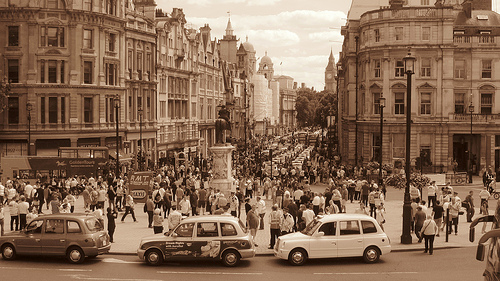Uber & the sharing economy
Is there a busier job than damage control at Uber? Let’s take a quick look at Uber’s recent public relations disasters:
- In the middle of a hostage crisis in Sydney that ended in three deaths, the company instituted surge pricing. Even though the pricing rose automatically rather than at the behest of a rapacious executive, the timing didn’t play well with Gawker.
- The car service was declared illegal in Thailand, Vietnam, Nevada, Portland, and Spain, and France and Honolulu are taking a closer look at its services.
- Going back farther, Uber has been accused of intimidation; it’s also run roughshod over concerns about employees’ “God view” of customers’ rides, leaving journalists queasy about its privacy policy. Although it’s made a halfhearted attempt to address privacy, the ACLU has weighed in.

Uber protests in London. Image from David Holt London.
Just as worryingly, though, its business model is under fire. Uber might be a staple of the so-called “sharing economy,” but that doesn’t mean there’s much sharing going on, according to The Nation. The basic complaint goes back to classic leftist kvetches about surplus value: even though Uber doesn’t provide much for its workers except a torrent of customers, it nonetheless collects 20% of every fare. According to the article, much of Uber’s budget goes into defending itself via lobbyists, advertising, and testy exchanges with regulators.
Worst of all, Uber itself may not end up as the ultimate beneficiary of its expenditures. Even if Uber carves out the legal space for itself to operate in cities across the world, what The Nation calls “second-mover advantage” may mean that Uber’s competitors will be able to move in on its turf without the burden of the fearsome up-front investments.
Since Uber isn’t providing its workers with cars, its employee base has a little more mobility than they might otherwise have, meaning Uber has to fight competitors tooth and nail, engaging in questionable behaviors like placing fake orders to Lyft. The deal for drivers can always be improved upon elsewhere, so there’s little reason to be too loyal. The physical capital required is mostly servers and a few coders to maintain the app, and with drivers already providing their own gas, cars, maintenance, and insurance, The Nation asks the question, why isn’t Uber a worker cooperative?
The obvious answer: because it wasn’t founded that way. Even the buzzwords gets in the way of accurate understanding as far as Uber goes – does “sharing economy” just mean that workers sustain all the risks in the service of a small class of entrepreneurs back at HQ? That kind of setup is probably more conducive to more VC funding than it is to a quick-and-easy worker revolution.
If a worker-owned Uber clone evolves, it probably won’t be from Uber, which is (after all) responsible for the return on Google’s $258 million investment. As long as Uber’s leadership keeps accumulating equity as the company becomes more valuable, something tells us they’re not going to rule themselves unimportant.
The worker’s cooperative version of Uber seems more likely to evolve separately – but once Uber itself has already done all the heavy lifting in terms of sorting out how to deal with regulators, a better deal for drivers may just be a few talented, fair-minded coders away.
Related Posts
Category: Regulations, Transportation

















